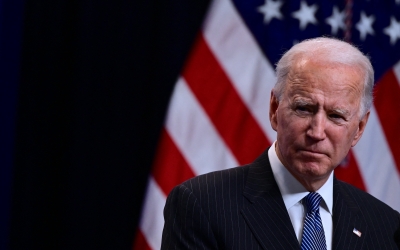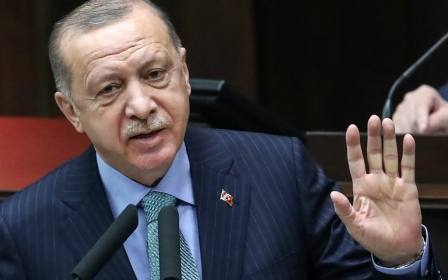Biden open to repealing US laws that enable 'forever wars'

US President Joe Biden has signalled willingness to repeal laws that allow the White House to authorise military strikes without the approval of Congress in an effort to end America's "forever wars".
Progressive advocates and lawmakers have for years been calling for revoking the Authorization for Use of Military Force (AUMF) measures that Congress passed hastily after the 9/11 attacks. The laws gave the president broad war powers.
On Friday, White House spokeswoman Jen Psaki said Biden will work with Congress to ensure that the current AUMFs are "replaced with a narrow and specific framework that will ensure we can protect Americans from terrorist threats while ending the forever wars".
The statement comes days after leading Democratic legislators questioned the legality of a US strike against Iran-backed groups in Syria that was not approved by Congress.
In a letter to congressional leaders last week, Biden said the American strikes, which came after rockets blamed on Iran-linked groups hit a base that hosts US forces in Iraq, were taken in "self-defence".
New MEE newsletter: Jerusalem Dispatch
Sign up to get the latest insights and analysis on Israel-Palestine, alongside Turkey Unpacked and other MEE newsletters
"I directed this military action consistent with my responsibility to protect United States citizens both at home and abroad and in furtherance of United States national security and foreign policy interests, pursuant to my constitutional authority to conduct United States foreign relations and as Commander in Chief and Chief Executive," Biden said.
On Tuesday, key senators from both major parties and led by Virginia Democrat Tim Kaine introduced a resolution to repeal war power authorisations that were approved in 1991 and 2002 for the purposes of the first and second Gulf wars.
"Last week’s airstrikes in Syria show that the Executive Branch, regardless of party, will continue to stretch its war powers," Kaine said in a statement.
"Congress has a responsibility to not only vote to authorize new military action, but to repeal old authorizations that are no longer necessary. The 1991 and 2002 AUMFs that underpinned the war against Iraq need to be taken off the books to prevent their future misuse."
The White House's Psaki appeared to welcome Kaine's effort on Friday. "Tim Kaine has been a leader on questions of war powers throughout his time in the Senate and has helped build a strong bipartisan coalition that understands the importance of Congress's constitutional prerogatives," she wrote on Twitter.
At a press briefing later on Friday, Psaki said the previous statement underlined the White House's "openness" to engage in discussions with lawmakers about the scope of military authorisation laws. President Biden "agrees that the AUMF has been around for 20 years, and it's long overdue for it to be updated," she told reporters.
War powers
Despite being decades old, these laws still constitute the legal basis for White House-authorised military action in the region without congressional consent.
In fact, former president Donald Trump cited the 2002 AUMF for the 2020 strike that killed top Iranian general Qassem Soleimani.
The previous administration also consistently overstated dubious links between Tehran and al-Qaeda, raising fears that it would use a 2001 AUMF that gave then-president George W Bush broad military authority to go after the perpetrators of the 9/11 attacks, to go to war with Iran.
Congressional efforts to repeal these laws in order to rein in the war powers of the White House have previously failed over the years.
The US Constitution gives Congress the authority to declare war and the president the power to mobilise troops as the commander in chief. But over the past decades, executive power has grown significantly when it comes to military action.
World War II was the last time Congress officially declared war. All the US major conflicts since 1950, including the wars in Korea, Vietnam, Afghanistan and both Gulf wars, as well as the transnational war on terror, took place without an official war declaration.
Progressive groups have long called for a more active role for Congress in authorising military action, a shift they say would decrease the chances of war.
Last year, dozens of progressive organisations urged then-candidate Biden to commit to revoking the 2001 AUMF.
"We ask that you consult with, and receive required authorization from Congress prior to engaging the US military abroad," the groups said in a letter, "and commit to supporting a repeal of the 2001 AUMF and ending all uses of US military force that have not been authorized by Congress in previous Administrations, including putting an end to unconstitutional participation in the Saudi-led war on Yemen."
Middle East Eye delivers independent and unrivalled coverage and analysis of the Middle East, North Africa and beyond. To learn more about republishing this content and the associated fees, please fill out this form. More about MEE can be found here.






